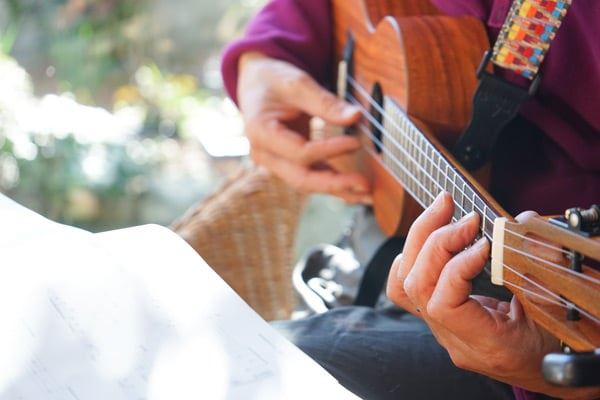While traditional treatment methods have proven to be effective time and time again, they aren’t the be-all-end-all of the recovery game. Over the years, alternative treatment methods have begun to become more popular as more and more people realize that more than one method can be effective. The key to successful treatment is for the person in recovery to buy into the program. A great way to do that is to provide them with fun and interesting treatment options to go along with the more mundane group and individual therapy sessions. One of the alternative therapies that have really taken off is music therapy and music therapy programs.
Music therapy programs are considered a complementary form of therapy that incorporates music, both listening and playing, into the therapy process. So, what exactly is music therapy and what are some of the benefits? Well, let’s take a deeper look.
What Is Music Therapy?

Music is one of the most important aspects of our daily lives. It’s also one of the most overlooked things that we do. For the most part, music is a part of our everyday lives in one way or another. We might listen to it on the way to work. We might sing or hum tunes that are stuck in our heads while at work. Some people might even play an instrument or be part of a band during their downtime. That’s why music therapy has become so popular among treatment professionals. It’s something that everyone can connect with.
In relation to addiction treatment and therapy, music therapy programs are considered an alternative treatment method. Within this alternative treatment method, individuals in recovery use music to help them manage any physical, emotional, or cognitive problems that are associated with their addiction.
Music therapy activities are typically led by a music therapist who is specifically trained in addiction treatment. These types of sessions can incorporate a variety of musical practices from creating music to just simply listening to music and singing along.
Music therapy has been proven to be effective in the overall addiction treatment process. This is because music therapy increases people’s motivation to get sober. In turn, music therapy also gets people more engaged in the entire addiction treatment process.
Additionally, music therapy provides a safe space for those in recovery to express themselves. Through such self-expression, individuals that attend music therapy programs for addiction are able to discover their own identities.
Are There Different Types of Music Therapy?
Yes, actually there are two different types of music therapy activities. There is receptive music therapy and active music therapy.
Receptive Music Therapy
Receptive music therapy involves listening to a song or even reading the lyrics to a song quietly. This can be done by either listening to a recording of a song or listening to someone play a song in person. During receptive music therapy, individuals focus solely on the emotional and spiritual meaning of the music that they’re listening to.
Active Music Therapy
Unlike receptive music therapy where individuals passively participate, in active music therapy, individuals take an active role in the musical process. This can include either singing, playing an instrument, or even writing a song. Taking an active role in creating music can be a therapeutic way to show how one feels.
What Are Some of the Different Music Therapy Techniques?

As we discussed above, there are two different types of music therapy techniques. There are, however, multiple types of techniques when it comes to practicing music therapy. Let’s take a look at some of these techniques.
- Drumming – Drumming is a great way for someone to express themselves in a non-verbal way. It is typically done in a group setting.
- Singing – Singing is one of the many different types of active therapy and is a great way to express oneself verbally.
- Songwriting – This is another great and powerful way to express yourself in a non-verbal way. Words can be incredibly powerful and can be a great way to share how you feel or what you are going through. By writing a song you can convey everything you want to say in a creative way. In fact, many individuals don’t know how they feel until they write about it.
- Dancing to music – Another non-verbal technique, dancing to music is another way in which you can express yourself and your feelings.
- Lyric discussion – Much in the same way that listening to music can help open you up to past memories or experiences, so can talking about the lyrics in a song.
- Playing music – Playing an instrument can help express yourself in the same way words can. In some instances, the playing of music can do so in a more powerful and meaningful way than doing so verbally.
- Listening to music – Many individuals use music to help them reflect on their feelings.
What Are Some of the Benefits of Music Therapy
It’s important to remember that by themselves, music therapy programs can not cure addiction. What they can do, though, is provide another form of therapy that can be a compliment for the overall recovery process. While alone it can’t cure addiction, it does have some great benefits that can help a person overcome addiction and learn how to live a clean and sober life. Some of these benefits include:
- Encourages meditation
- Promotes self-awareness
- Promotes self-expression
- Helps reduce stress
- Encourages relaxation
- Helps alleviate depression and anxiety symptoms
- Provides a healthy alternative for curing boredom and restlessness
- Encourages optimism
- Helps foster communication between therapist and patient
- Helps with concentration and focus
- Reduces muscle tensions and headaches
- Promotes better sleep
- Boosts the body’s immune system
- Reduces feelings of loneliness and low self-esteem
Can Music Therapy Programs Help Treat Other Issues Too?
Many people who enter into addiction rehab also have other underlying ailments as well. Sometimes these ailments are what helped caused people to suffer from addiction in the first place. This is particularly true for individuals that suffer from mental illness.
In some cases, new ailments, such as mental illness, develop as a result of the stress that comes with addiction. When someone is battling addiction as well as another ailment, such as a mental health disorder, it’s known as a co-occurring disorder.
In addition to helping treat addiction, music therapy can also be beneficial in helping treat certain co-occurring disorders. This is because music therapy activities can help people cope with mental illness, on top of helping them manage their addiction triggers.
Music Therapy for Depressive and Anxiety Disorders

Many people who suffer from addiction suffer from depression and anxiety-related disorders as well. In many cases, the feelings of anxiety and depression are what cause individuals to start misusing substances to begin with. For people who suffer from debilitating depression and/or anxiety, music therapy can be a great way to elevate their mood, bring them relaxation, and help them develop a more positive outlook on life.
Music Therapy for Autism and Autistic Spectrum Disorders
Autistic spectrum disorder, or ASD, is typically diagnosed in young children. It’s considered a neurological disorder. This means that people that suffer from autism contain a dysfunction in the brain of some sort.
Individuals that suffer from autism or ASD tend to have difficulty with verbal expression in addition to struggling in social settings along with other behavioral issues. People that suffer from ASD also tend to be very responsive to music therapy due to the fact that it can help enhance their ability to communicate in a group or social settings. Music therapy can even help individuals with ASD to learn new skills that they can use in their lives to help them overcome some of the deficiencies associated with autism.
Are There Any Limitations Associated With Music Therapy?
With everything in life, there are positives and negatives, and music therapy is no different. While it is a great form of complementary therapy, it does have some limitations. What are those limitations? Well, let’s take a look at a few:
- Sometimes certain forms of music can be associated with a person’s previous drug use. It’s important to try and avoid these forms of music whenever possible to avoid any setbacks.
- In some instances, music therapy has resulted in the development of agitated, aggressive, or even negative emotional feelings. If this happens it is best to stop participating in music therapy.
- It’s important to remember that music therapy is a complementary therapy and should NOT be used as the only form of addiction therapy that a person undergoes.
Are You Interested In Learning More About Music Therapy Programs?
Music therapy can be a great way to complement the more traditional addiction treatment programs. At Grace Land Recovery, we pride ourselves on offering a variety of alternative and complementary treatment options, including music therapy programs. If you or someone you know is suffering from addiction and could benefit from not just traditional therapy but also alternative therapies such as music therapy, contact us today to learn more about the different therapies and treatments that we offer.

